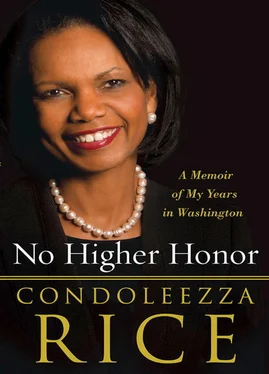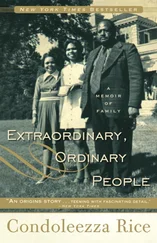I was scheduled to go to Europe in a few days for my last NATO summit. The President asked if I could go to India and Pakistan first. I agreed but thought it wise to stop in London on the way. Sitting in London, I had a strong sense of déjà vu. Hadn’t we been here before with the Brits, trying to head off a war in South Asia in 2001? I’d once said that I knew it was time to step down as provost when issues that I thought I’d resolved in year one came back around in year six. South Asia , I thought. Here we go again .
But when I arrived in India, I could see and feel the difference. A lot had changed since 2001; most important, the Indians trusted us. They didn’t want war, though they were being pushed hard by the press and public opinion to avenge the attacks. When I arrived at Prime Minister Singh’s home that night, it was easy to see how much pressure he was under. But he was determined to avoid war. The foreign minister felt the same. “But you have to get Pakistan to do something.” Clearly the impending elections made the situation even more difficult.
When I arrived in Islamabad, it was obvious that a lot had changed there too. Musharraf hadn’t always been effective, but he had exuded confidence, in part due to the loyalty of the army to him personally. Now I was face to face with a new, weak civilian government headed by Benazir Bhutto’s widower, Asif Ali Zardari. The Pakistanis were at once terrified and in the same breath dismissive of the Indian claims. President Zardari emphasized his desire to avoid war but couldn’t bring himself to acknowledge Pakistan’s likely role in the attacks. Pakistani Prime Minister Yousaf Raza Gillani, who I also met, launched into a long speech about how Pakistan fought extremists too. They had been told that the terrorists who had launched the attack had nothing to do with Pakistan.
“Mr. Prime Minister,” I said, “either you’re lying to me or your people are lying to you.” I then went on to tell him what we—the United States—knew about the origins of the attack. I didn’t accuse Pakistan’s government of involvement; that wasn’t the point. But rogues within the security services might have aided the terrorists. It was time to admit that and to investigate more seriously. Finally, I went to meet the chief of staff, General Ashfaq Pervez Kayani. Our military liked him and considered him honest and effective. He was the one person who, even if he couldn’t admit responsibility, understood that Pakistan would have to give an accounting of what had happened. That was a start.
When I left South Asia, I wasn’t certain that I’d achieved what I intended. But as the days went on, the crisis eased. Almost a month later, on December 27, Zardari admitted that “nonstate actors” existed in Pakistan and had to be rooted out. It wasn’t a great statement, but, taken together with earlier promises to investigate the Mumbai attacks, it was enough. Singh’s party had won overwhelmingly a few weeks before in the provincial elections, and the prime minister no longer had to placate the war caucus.
Several days after returning from South Asia and Europe, I attended the Kennedy Center Honors for the last time as secretary of state. I always loved the event, which honors our finest artists. On Saturday night, the secretary hosts a gala dinner in the Ben Franklin room at the State Department at which the recipients receive their honors. It was one of my favorite nights of the year, a chance to sit with Itzhak Perlman, Joshua Bell, Robert Redford, Elton John, Diana Ross, and Aretha Franklin, among others.
Then, on Sunday night, the President hosts a reception for the honorees before the performances at the Kennedy Center. There is a nice ceremony at which the achievements of the recipients are recalled. That year, the last award was dedicated to the wonderful actor Morgan Freeman. The President introduced him by recalling his role in the movie Deep Impact , which is about a black man who is President of the United States when a meteor hits the earth. “That’s about the only thing that hasn’t happened in the last eight years,” the President quipped.
When he returned to his seat, I leaned over and said, “Don’t tempt fate. We’ve still got a few weeks left.”

58
ONE LAST CHANCE FOR A PALESTINIAN STATE
IN THE WANING MONTHS of our time in Washington, we tried one last time to secure a two-state solution. The Olmert proposal haunted the President and me. In September the prime minister had given Abbas a map outlining the territory of a Palestinian state. Israel would annex 6.3 percent of the West Bank. (Olmert gave Abbas cause to believe that he was willing to reduce that number to 5.8 percent.) All of the other elements were still on the table, including the division of Jerusalem. Olmert had insisted that Abbas sign then and there. When the Palestinian had demurred, wanting to consult his experts before signing, Olmert refused to give him the map. The Israeli leader told me that he and Abbas had agreed to convene their experts the next day. Apparently that meeting never took place. But I knew what had been proposed, and I asked Jonathan Schwartz, a State Department lawyer with many years of experience in the issue, to construct an approximation of the territorial compromise. I wanted to preserve the Olmert offer.
I talked to the President and asked whether he would be willing to receive Olmert and Abbas one last time. What if I could get the two of them to come and accept the parameters of the proposal? We knew it was a long shot. Olmert had announced in the summer that he would step down as prime minister. Israel would hold elections in the first part of the next year. He was a lame duck, and so was the President.
Still, I worried that there might never be another chance like this one. Tzipi Livni urged me (and, I believe, Abbas) not to enshrine the Olmert proposal. “He has no standing in Israel,” she said. That was probably true, but to have an Israeli prime minister on record offering those remarkable elements and a Palestinian president accepting them would have pushed the peace process to a new level. Abbas refused.
We had one last chance. The two leaders came separately in November and December to say good-bye. The President took Abbas into the Oval Office alone and appealed to him to reconsider. The Palestinian stood firm, and the idea died.
Now, as I write in 2011, the process seems to have gone backward. The Palestinians are speaking in the UN General Assembly of unilaterally declaring statehood. There are familiar squabbles about Israeli settlement activity. I certainly know the frustration of Israeli announcements of building new housing on disputed land; it often felt as though those bulletins were issued just after the secretary of state had traveled there. It happened to me several times. Not only would I call Olmert and Livni to complain, but I would also publicly denounce what Israel had done, reminding everyone that the United States would not recognize unilateral alterations of the status quo at the time of negotiation. But I never let progress on the settlement issue become a U.S. precondition for negotiations. I believed that once there was an agreement, the question of settlements would be moot.
In the end, the Palestinians walked away from the negotiations—and soon a new Israeli prime minister would walk away too. Abbas was told by numerous Israelis, including some of Olmert’s closest advisors, that the lame-duck prime minister did not have the legitimacy to deliver the deal. But had he expressed a willingness to accept the extraordinary terms he’d been offered, it might have been a turning point in the long history of the intractable conflict. It might be a long time before another Israeli prime minister offered anything as dramatic again. I turned over the negotiating file to my successor. The conditions were almost ripe for a deal on our watch, but not quite. Still, I have to believe that sooner or later, there will be a two-state solution. There is no peaceful alternative.
Читать дальше













